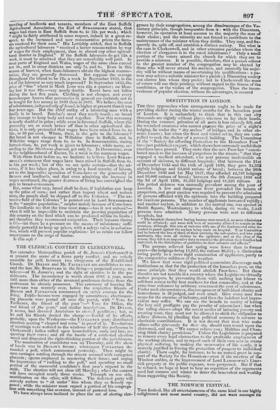DESTITUTION IN LONDON.
Tun time approaches when arrangements ought to be made for providing shelter during the winter months for the houseless poor: of London. It is melancholy to think that in this vast city. thousands are nightly without places whereon to lay their heads. During the summer, privation of all sorts is less severely felt, and the wretched creatures who cannot procure the price of a night's lodging, lie under the 44 dry arches " of bridges, and in other ob- scure haunts ; but when the frost and winter set in, they are come pencil to seek the shelter of a covered building. The Committed of the " Society for affording Protection to the Houseless Poor". have just published a report, which shows how extremely useful their exertions have proved. They state that the new Poor-law " contri. buted much to the increase of pauperism in the streets: " that they engaged a medical attendant, who sent persons inadmissible on account of sickness, to different hospitals : that between the 21st of December 1835 and the 18th of April 1836, they gave 24,352 nightly lodgings and 63,893 rations of bread; between the 26th
December 1836 and 1st May 1837, they afforded 42,136 lodgings: and 99,806 rations of bread ; between the 9th January 1838 and the 2d of April 1838, 31,923 lodgings and 81,226 rations. At this period sickness was unusually prevalent among the poor of London. A low and dangerous fever pervaded the haunts of pauperism, and great caution was required to prevent the admission of persons afflicted with the epidemic into the building prepared for destitute persons. The number of applicants increased rapidly; and another asylum, in addition to the central one, was opened in Smith Square, Westminster; to which, during six weeks, 5,443 persons were admitted. Ninety persons were sent to different hospitals, but
" The hospitals themselves having become over-crowded, no more admissions could be obtained ; and some sick were of necessity allowed to remain on the premises, although this was at variance with one of the fundamental rules in- tended to guard against the asylum being made an hospital. Your Committee had to lament the loss of three of their servants, the sub-matron and two male assistants, who were all victims to the epidemic ; and at the close of the season, they felt it an imperative duty to consider the privation their families had sustained, m the distribution of gratuities to their servants and officers."
The persons relieved last spring were fewer than in former years—the lodgings being 11,955, the rations 36,254 ; a diminution owing partly to a more rigid examination of applicants, partly to the comparative mildness of the weather.
We know that some rigid political economists discourage such institutions as that for the protection of the houseless poor, on the same principle that they would abolish Poor-laws. But these theories are not tenable in a country where the Legislature virtually makes paupers, by preventing those with nothing but labour to sell from access to the best markets for that commodity, and at the same time enhances by arbitrary enactment the cost of subsistence. Under such circumstances, discouragement of individual charity and benevolence is ill-judged, and even cruel. Give every man free scope for the exercise of industry, and then the indolent and impro- vident may suffer. We can see the benefit to society of letting the lazy and profligate pay the penalty of misconduct ; but when the ruling classes adopt the surest modes of inducing poverty and creating want, they must not be allowed to shirk the obligation to relieve distress, by pleading that political economy is adverse to charitable contributions. It is not decent that men who make others suffer grievously for their sin, should turn round upon the distressed, and say, " We cannot relieve you ; Malthus and Chan• ning think charity pernicious." Unless the Legislature is prepared to remove every legal obstruction to the profitable employment of the working classes, and to repeal such of their own acts as create physical suffering, by making the necessaries of life costly, it is scarcely justified in leaving the protection of paupers to individual charity. There ought, for instance, to be an annual grant in sup- port of the Society for the Houseless—even if the erection of the Windsor stables, or the improvement of Lord Lexsnowse's Lime- rick property at the public expense, were postponed. But if that be refused, we hope at least to hear no repetition of the arguments used last autumn and winter to deter the benevolent and wealthy from supporting this Society.


























 Previous page
Previous page